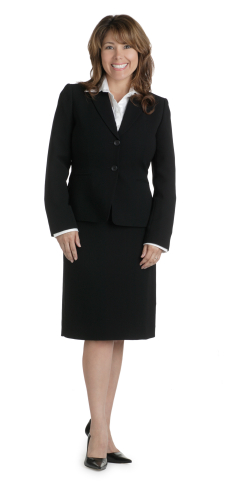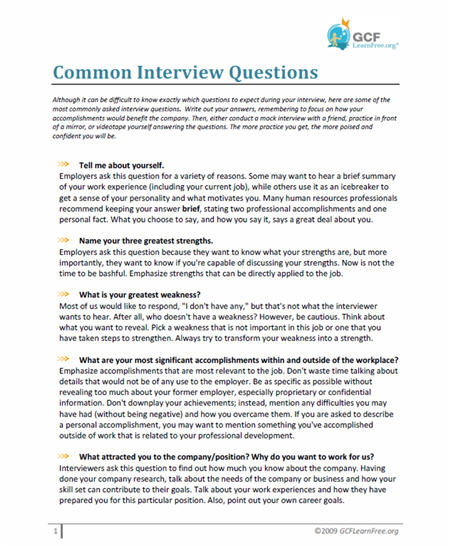
Interviewing Skills
What to prepare Before an Interview
Introduction
 Knowing that you have an interview coming up can be stressful. But if you use the time before your interview to prepare yourself, you will likely look and feel more confident during the interview.
Knowing that you have an interview coming up can be stressful. But if you use the time before your interview to prepare yourself, you will likely look and feel more confident during the interview.
This lesson will guide you through different ways to prepare for an interview. It will explain how to research the company beforehand. It will help you identify appropriate interview attire and will provide you with a checklist of items to bring along with you to the interview. In addition, it will help you both prepare to ask the right questions and practice answering the questions you are likely to be asked.
Research the company
During an interview, you will need to show an employer that you know about and understand the needs of the company. One way to prepare for this is to research the company.
In general, you want to find out:
|
Researching tools
- Use our Company Research Guide to gather essential information.
Don't worry if you can't find every answer to every question. You will likely use only part of this information in your interview, but it is better to go in with a good understanding of the company. Print it out, take notes on it as you research, and take it with you to your interview. - If you can't find this information on the company's website, consider using Linkedin or another networking site to find someone who can tell you about the company.
- If you are a student or recent graduate, you can visit your college's career services office.
- If you are willing to pay for the service, websites like Hoovers, OneSource, and LexisNexis offer various types of information about a vast number of companies. If you don't want to pay, you may be able to access these websites for free through your local public library.
Other researching tips
- Drive to the interview location beforehand—preferably at the same time of day as your interview—so you can get a good estimate of how long the travel time will be on the actual day of your interview. You do NOT want to be late for an interview!
- The actual job description or job posting will likely contain information about the company.
Deciding What to Wear to Your Interview

Like most people, interviewers are susceptible to first impressions, and one of the first things an interviewer will see about you is how you're dressed. Since you want to make sure that first impression is a good one, here are some things to keep in minding when choosing an outfit for an interview.
- A good interview outfit should be relatively formal, so no jeans, T-shirts, or sneakers unless you've specifically been asked to wear them. A business suit is usually a safe bet for either a man or a woman. If you don't have a business suit, a long-sleeved, solid-colored shirt (button-down for men) or sweater and a pair of dark-colored cotton or wool pants will usually work.
- When you choose your clothes, make sure they fit well, are not visibly worn out, and are comfortable to sit down in. Both men and women should avoid wearing clothing that's too tight, since provocative clothing isn't seen as professional attire. Women should avoid low necklines and very short skirts for the same reason.
- Keep accessories to a minimum. Wearing too much jewelry, make-up (for women), perfume, or cologne is considered unprofessional, and it won't make a good impression on the interviewer. You may even want to avoid perfume or cologne altogether, since you have no way of knowing whether any of the people you'll meet are allergic to it.
- Wear dark or neutral colors, even if these aren't colors you ordinarily wear. This applies not only to the clothes you wear, but also to accessories and shoes. Women should also wear neutral colored stockings, and men should wear neutral or dark ties.
- Make sure you're well-groomed when you're going to an interview. Check that your hair and nails are neat and clean and that your clothing is unwrinkled or ironed before leaving the house. This shows the interviewer that you took time to prepare for the interview and are taking it seriously.
- Keep in mind that not every tip on this list will apply in all situations. For an audition interview, for example, you may be expected to dress less formally, depending on what you're going to be asked to do. If you're not sure what to wear, you may be able to call the Human Resources department of the company and ask what would be appropriate. You can also ask friends or colleagues who may have interviewed at similar workplaces.
Inappropriate and risky interview dress
Use the interactive below to learn more about what is considered inappropriate dress for a job interview.
What to take or not take with you to an interview
After you have decided what to wear, it's time to think about what you should bring along with you to the interview. In addition, it is important to know what you should leave at home or in your car.
Review our Interview Checklist to learn more about what to take to an interview and what to leave at home. To download and print a copy of your own, click the image below.
 It is best to assemble the items you are bringing along in some sort of briefcase or other professional-looking organizer. Remember, your first impression should be as a neat, organized, and prepared individual!
It is best to assemble the items you are bringing along in some sort of briefcase or other professional-looking organizer. Remember, your first impression should be as a neat, organized, and prepared individual!
Practice answering questions
Because the largest portion of your interview will be spent answering questions, the best way to prepare for an interview is to anticipate the questions you will likely be asked and then practice your answers to these questions.
All interviewers will ask some common interview questions to determine if you are the best candidate for the job. These questions usually deal with your career goals, your level of interest in the job and company, your job skills and motivation, and your interpersonal communication skills.
To learn more about common types of interview questions, review our Common Interview Questions sheet. To download and print a copy of your own, click the image below.
 Page 1 of 3. Click to print full document.
Page 1 of 3. Click to print full document.
For the best results, you may consider practicing you answers in front of a mirror, with a friend, or using a video camera. These methods can provide constructive feedback, in addition to building the confidence and comfort you need for the real interview.
The STAR method for answering questions
You may not know exactly which questions you'll be asked during your interview, but there is something you can do to make sure you are as prepared as possible to answer them. Practice using the STAR method for answering. The STAR method begins with a description of a Situation, then describes the Tasks that were necessary for the situation, the Actions you took to address that situation, and the Result. The following is a sample STAR answer for the question, “Tell me about a time you were able to satisfy an upset customer".
Situation: Our new product was set to be released in May and was highly anticipated in the industry. In fact, one of our biggest customers was already relying on our product to include in its own business platform. Unfortunately, one of our suppliers didn’t meet our contract needs in April, which could have delayed our product release and would have made that customer dissatisfied.
Task: To address this problem, my team had to find a new supplier as quickly as possible or look for an alternate way to satisfy our customer.
Action: After conducting rapid research into likely suppliers, it became evident that none would be able to help us meet our product specs as written. Leading the product team back to the drawing board, we altered the design of our product in a way that let us utilize a ready supplier without compromising the primary functionality of our product.
Result: Because we worked with what the new supplier had readily available, we were able to complete production on schedule. The cost of the new supplier was less than the original, so our own price point was able to be reduced as well. Both of these results greatly pleased our customer, which ended up increasing its order and putting us over our sales goal within the first three months of product availability.
Have several of these STAR stories prepared before going into the interview. Use the accomplishments you included on your resume as a starting point. Then outline three STAR stories to talk about in your interview.
Preparing your own questions to ask
An interview is as much for you as it is for the hiring manager. It is your chance to find out more about the job, the company, the industry, and your potential boss. Your questions should show your genuine interest in or understanding of the company. Knowing which questions to ask and which NOT to ask can help you get more out of your interview—and can perhaps even get you the job!
Review our Questions to Ask sheet to learn more about what kinds of questions you should ask during an interview. To download and print a copy of your own, click the image below.
 Page 1 of 3. Click to print full document.
Page 1 of 3. Click to print full document.
If you don't ask any questions during your job interview, the hiring manager may believe that you are not really interested in the job!
